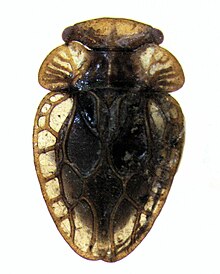Peloridiidae
| Peloridiidae | |
|---|---|
 |
|
| Xenophyes rhachilophus | |
| Scientific classification | |
| Kingdom: | Animalia |
| Phylum: | Arthropoda |
| Class: | Insecta |
| Order: | Hemiptera |
| Suborder: | Coleorrhyncha |
| Family: |
Peloridiidae Breddin, 1897 |
| Genera | |
|
|
|
The Peloridiidae or moss bugs are a family of true bugs, comprising eighteen genera and thirty-four species. They are small, ranging in length from 2 to 4 mm, rarely seen, peculiarly lumpy, flattened bugs found in Patagonia (Argentina and Chile), New Zealand, eastern Australia, Lord Howe Island, and New Caledonia. All the Peloridiidae species are flightless, except one (Peloridium hammoniorum). Their present distribution suggests they have existed before the breakup of Gondwana, and their relation to Heteroptera (true bugs) dates back to at least the upper Permian, more than 230 Mya ago. Peloridiids are found amongst mosses and liverworts, commonly in association with southern beech forests. They have become known as moss bugs for their habit of feeding on mosses.
Peloridiidae are the only extant family in the suborder Coleorrhyncha. Historically the Peloridiidae and their fossil kin were assigned to a variety of orders. In 1929 Myers and China placed them in the Homoptera, in 1962 China placed them in the Auchenorrhyncha, and in 1963 Evans placed them in the Cicadomorpha. This was followed by Bourgoin in 1997 who placed the Peloridiidae in Fulgoromorpha. However, following Bekker-Migdisova's 1952 suggestion, and Popov and Wootton's 1977 review, there is consensus that the Peloridiidae belong in Coleorrhyncha and that Coleorrhyncha is a sister group to the Heteroptera. Schlee (1969), Wheeler et al. (1993), Schuh & Slater (1995), Campbell et al. (1995), Ouvrard et al. (2000) and Brozç (2007).
The question remains whether this affinity between the Coleorrhyncha and the Heteroptera necessitates the imposition of a suborder between them and the order Hemiptera. In 1995 Sorensen proposed the name Prosorrhyncha for such suborder. (See the Heteroptera and Prosorrhyncha pages for a discussion).
...
Wikipedia
